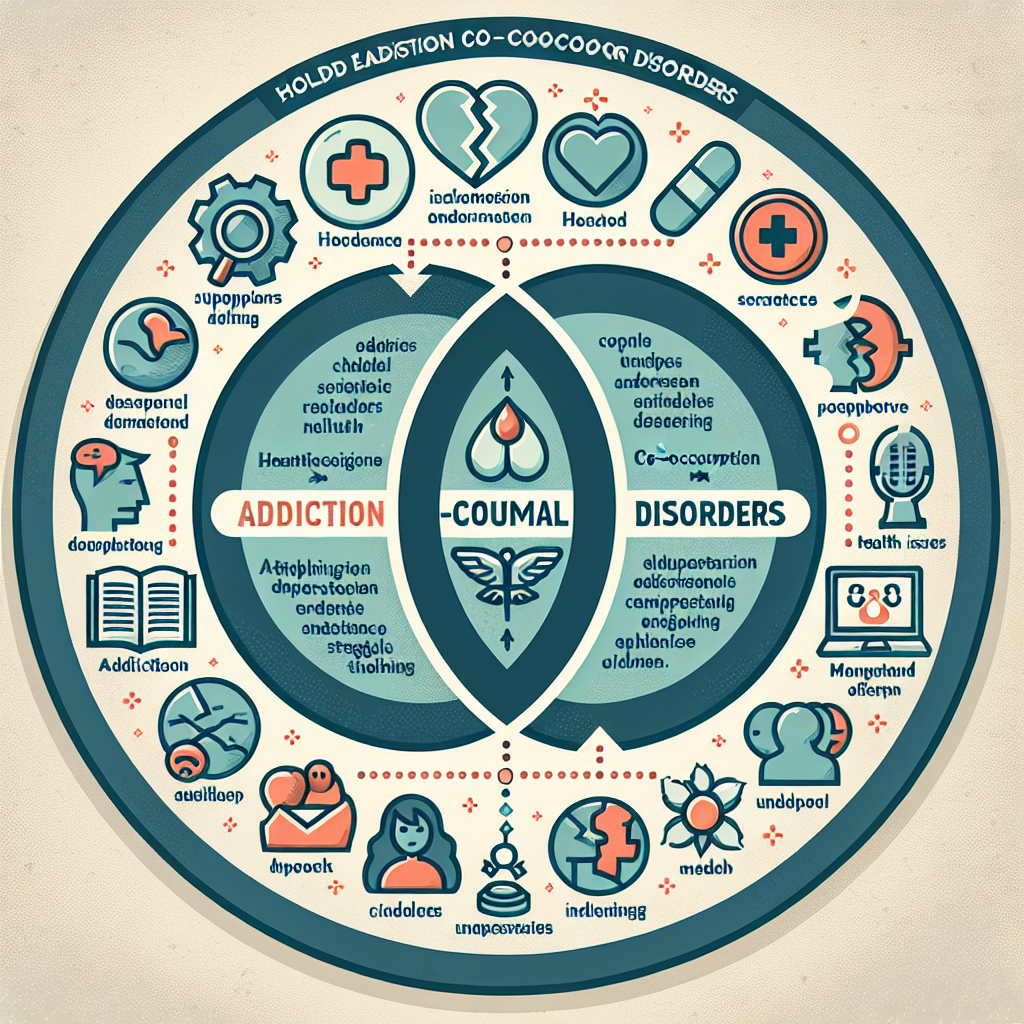-
Table of Contents

“Unified Support for Dual Struggles: Empowering Recovery from Addiction and Mental Health Challenges”
Introduction
Recognizing Co-Occurring Disorders: Helping a Loved One with Addiction and Mental Health Issues
Co-occurring disorders, also known as dual diagnosis, refer to the simultaneous presence of both a mental health disorder and a substance use disorder in an individual. This complex interplay between addiction and mental health issues can significantly complicate the diagnosis, treatment, and recovery process. Understanding and recognizing the signs of co-occurring disorders is crucial for providing effective support and intervention for loved ones struggling with these intertwined challenges. This introduction aims to shed light on the importance of identifying co-occurring disorders, the impact they have on individuals and families, and the strategies for offering compassionate and comprehensive care to those affected. By fostering awareness and knowledge, we can better assist our loved ones on their journey to recovery and mental well-being.
Understanding the Signs: How to Recognize Co-Occurring Disorders in Loved Ones
Recognizing co-occurring disorders in loved ones can be a challenging yet crucial step in providing the support they need. Co-occurring disorders, also known as dual diagnosis, refer to the simultaneous presence of a mental health disorder and a substance use disorder. Understanding the signs of these intertwined conditions is essential for offering effective help and fostering a path to recovery. By being observant and compassionate, you can play a pivotal role in your loved one’s journey toward healing.
Initially, it is important to recognize that the symptoms of co-occurring disorders can be complex and multifaceted. Mental health issues such as depression, anxiety, bipolar disorder, and schizophrenia often manifest in ways that overlap with the behaviors associated with substance abuse. For instance, a person struggling with depression may turn to alcohol or drugs as a means of self-medication, which can further exacerbate their mental health condition. Similarly, someone with anxiety might misuse substances to alleviate their symptoms, leading to a vicious cycle of dependency and deteriorating mental health.
One of the key indicators of co-occurring disorders is a noticeable change in behavior. If your loved one begins to withdraw from social activities they once enjoyed, exhibits erratic mood swings, or shows signs of increased irritability, these could be red flags. Additionally, pay attention to any significant changes in their sleeping patterns, appetite, or personal hygiene. These shifts can often signal underlying mental health issues that may be compounded by substance use.
Another critical aspect to consider is the presence of denial or defensiveness when discussing their behavior. Individuals with co-occurring disorders may be reluctant to acknowledge their struggles due to the stigma associated with both mental health issues and addiction. They might downplay the severity of their substance use or dismiss concerns about their mental well-being. In such cases, it is essential to approach the conversation with empathy and without judgment, creating a safe space for them to open up about their experiences.
Furthermore, it is important to observe any physical signs that may indicate substance abuse. These can include unexplained weight loss or gain, bloodshot eyes, frequent nosebleeds, or track marks on their arms. While these symptoms alone do not confirm a co-occurring disorder, they can provide valuable clues when combined with behavioral and emotional changes.
In addition to these signs, consider the impact of their behavior on their daily life. Are they struggling to maintain their responsibilities at work, school, or home? Have they experienced legal issues or financial difficulties as a result of their actions? These consequences can often highlight the severity of their condition and the need for professional intervention.
Recognizing co-occurring disorders in a loved one is just the first step. Encouraging them to seek professional help is crucial for their recovery. Treatment for dual diagnosis typically involves an integrated approach that addresses both the mental health disorder and the substance use disorder simultaneously. This can include therapy, medication, support groups, and lifestyle changes. By supporting your loved one in finding the right treatment, you can help them regain control of their life and work towards a healthier future.
In conclusion, understanding the signs of co-occurring disorders requires a keen eye and a compassionate heart. By being attentive to changes in behavior, physical symptoms, and the overall impact on their life, you can identify when a loved one may be struggling with both addiction and mental health issues. Offering your support and encouraging them to seek professional help can make a significant difference in their journey toward recovery. Remember, your empathy and understanding can be a beacon of hope for your loved one as they navigate the challenges of co-occurring disorders.
Effective Strategies for Supporting a Loved One with Both Addiction and Mental Health Issues
Supporting a loved one who is grappling with both addiction and mental health issues can be a daunting and emotionally taxing journey. However, recognizing co-occurring disorders and implementing effective strategies can make a significant difference in their recovery process. The first step in this journey is understanding that addiction and mental health issues often intertwine, creating a complex web that requires a compassionate and multifaceted approach.
One of the most crucial strategies is to educate yourself about co-occurring disorders. Knowledge is power, and understanding the intricacies of how addiction and mental health issues interact can provide valuable insights into your loved one’s behavior and needs. This understanding fosters empathy, allowing you to approach the situation with patience and compassion rather than frustration or judgment. Additionally, it equips you with the tools to recognize the signs of relapse or worsening mental health, enabling timely intervention.
Communication plays a pivotal role in supporting someone with co-occurring disorders. Open, honest, and non-judgmental conversations can create a safe space for your loved one to express their feelings and struggles. It is essential to listen actively and validate their experiences, showing that you are there to support them unconditionally. Avoiding blame and criticism can help build trust, making it easier for them to seek help and adhere to treatment plans.
Encouraging professional help is another vital strategy. Co-occurring disorders require specialized treatment that addresses both addiction and mental health issues simultaneously. Encourage your loved one to seek help from professionals who are experienced in dual diagnosis treatment. This may include therapists, psychiatrists, and addiction specialists who can develop a comprehensive treatment plan tailored to their unique needs. Supporting them in attending appointments and adhering to prescribed treatments can significantly enhance their chances of recovery.
Creating a supportive environment is equally important. This involves removing any triggers that may exacerbate their condition, such as substances or stressful situations. Encouraging healthy habits, such as regular exercise, a balanced diet, and sufficient sleep, can also contribute to their overall well-being. Additionally, fostering a sense of routine and stability can provide a comforting structure that helps them navigate the challenges of recovery.
While supporting your loved one, it is crucial to take care of yourself as well. The emotional toll of caring for someone with co-occurring disorders can be overwhelming, and neglecting your own well-being can lead to burnout. Seeking support from friends, family, or support groups can provide a much-needed outlet for your emotions and experiences. Remember, you cannot pour from an empty cup; taking care of yourself enables you to be a more effective and compassionate support system.
Lastly, celebrating small victories can have a profound impact on the recovery journey. Acknowledging and celebrating progress, no matter how minor, can boost your loved one’s morale and motivation. Recovery is often a long and arduous process, and recognizing achievements along the way can provide the encouragement needed to keep moving forward.
In conclusion, supporting a loved one with co-occurring disorders requires a blend of education, communication, professional help, a supportive environment, self-care, and celebration of progress. By implementing these strategies, you can play a pivotal role in their recovery journey, offering the hope and support they need to overcome the challenges of addiction and mental health issues. Your unwavering support can be the beacon of light that guides them towards a healthier and more fulfilling life.
Q&A
1. **What are co-occurring disorders?**
Co-occurring disorders, also known as dual diagnosis, refer to the presence of both a mental health disorder and a substance use disorder in an individual. These conditions often interact and exacerbate each other, making treatment more complex.
2. **How can you help a loved one with co-occurring disorders?**
To help a loved one with co-occurring disorders, it is crucial to encourage them to seek integrated treatment that addresses both their mental health and substance use issues simultaneously. Support them by being understanding, patient, and helping them access professional resources such as therapists, support groups, and rehabilitation programs.
Conclusion
Recognizing co-occurring disorders is crucial for effectively helping a loved one who struggles with both addiction and mental health issues. Integrated treatment approaches that address both conditions simultaneously are essential for achieving better outcomes. Early identification, comprehensive assessment, and a supportive environment can significantly enhance the recovery process. By understanding the complexities of co-occurring disorders and advocating for appropriate care, families and caregivers can play a pivotal role in their loved one’s journey toward recovery and improved well-being.



